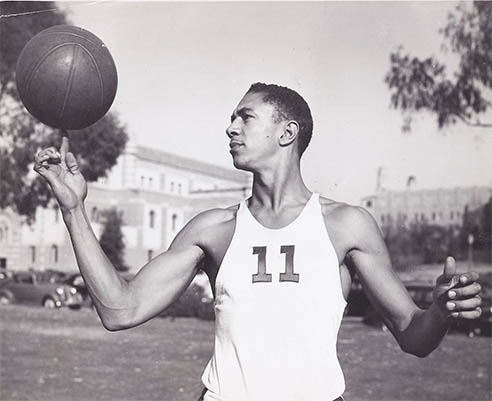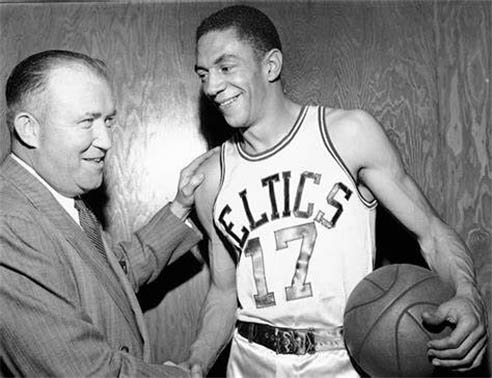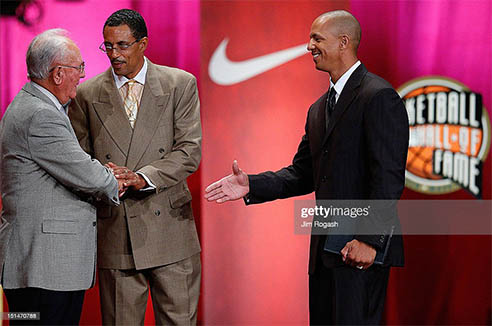Black History Month Spotlight: Don Barksdale
02/22/2023
Black History Month is an annual celebration of the achievements by Black Americans and a time for recognizing their impact in U.S. history. For this week in February 2023, we commemorate AAU Alum and a pioneer in the game of basketball, Don Barksdale.
By: Troy MacNeill
ORLANDO, Fla. (February 22, 2023) – Don Barksdale, born in March of 1923, changed the way people looked at basketball. Barksdale broke barriers in basketball and paved the way with his immense talent, strong determination, and unrelenting spirit.
Being told no and being cut was nothing new to Don Barksdale, even early on. It wasn’t because he wasn’t good enough. In fact, he was consistently one of the best players on the court. But because of his skin color, Barksdale was told no. However, his determination and spirit wouldn’t allow him to take no for an answer.
Born in Oakland, California, Barksdale would attend the nearby Berkeley High School. While at Berkeley, he was cut from the high school basketball team for three straight years because the coach wanted no more than one black player on his roster. That wouldn’t stop Barksdale from playing. He instead honed his basketball skills by playing at the park daily. He became good enough to go play at Marin Junior College from 1941 to 1943 before he earned a scholarship to the University of California Los Angeles (UCLA).

UCLA is where Barksdale began to break the color barrier and gain recognition, both on and off the court. Away from the hardwood, while attending UCLA, Barksdale owned a record store. This was one of only two black-owned record stores in Los Angeles. This has him rubbing shoulders with music giants like Etta James and Nat King Cole. After college, Barksdale would become a renowned DJ, known for his velvet smooth voice. He was called “the eminent disc jockey in northern California for years,” by football coaching legend Bill Walsh.
The recognition of his silky-smooth basketball skills would follow Don onto the hardwood. The lanky 6’6 center for the Bruins was dominating on the court, leading his 1947-48 UCLA team to a 18 win 7 loss record, one of only two winning seasons for the school during coach Wilbur Johns’ 9-year coaching stint. Thanks to his play, Barksdale became the first African American to be named a consensus All-American. This would be the many of his “firsts” in the game of basketball.
After college, Barksdale would become the first African American to play on the U.S. Olympic basketball team. He also would become the first African American to win an Olympic gold medal in basketball. But this wasn’t without trouble or doubters.

Barksdale had been playing basketball with the Amateur Athletic Union (AAU) on the Oakland Bittners after his time with UCLA. Then, in 1948, Barksdale was given an at-large berth to join the Olympic team, thanks to lobbying by Fred Maggiora. Maggiora was a member of the Olympic Basketball Committee and a politician in Oakland. He had seen Barksdale play and he knew there was no way the Olympic team could leave him behind. Maggiora recalled to Barksdale that some committee members’ response to a black Olympian was “Hell no! That will never happen.”
But through the lobbying of Maggiora and after the coach of the Phillips 66ers said that Barksdale was the best basketball player in the country, there was no way he could be turned down. His skill on showcase during the scrimmage and with the AAU earned him a spot on the team. The Olympic basketball team wasn’t what it is today. There were no professional NBA stars playing. The team consisted of five University of Kentucky Wildcat basketball players who had just won the NCAA Division I basketball championship, players from the AAU National Champion Phillips 66ers, and one lone black player in Barksdale.
The team would go scrimmage on Stoll Field, then the home of the Kentucky football team, in front of 14,000 spectators, the largest crowd to watch basketball in Kentucky at that time. Barksdale became the first African American to play against Kentucky in Lexington. Times were different and Barksdale couldn’t even stay at the hotel with the rest of the team. One of the coaches of the Olympic team was Kentucky’s own coach, Adolph Rupp, still more than 20 years away from recruiting his first black player for the Wildcats. Through death threats, scrutiny, and racial tension, Barksdale still did what he wanted to do most… he played basketball. And coaches took notice.
“Rupp turned out to be my closest friend," Barksdale said in an interview. "We went to London and won all 12 games and got the gold medal."
But he had to brush off indignities just about every step of the way. Later, coach Rupp told Barksdale, "Son, I wish things weren't like that, but there's nothing you or I can do about it." Barksdale agreed. He lived by a very simple philosophy. He wasn't interested in protest; he was interested in playing basketball. That’s exactly what Barksdale did, he traveled to London with his teammates and became the first African American to win a gold medal for basketball.
After the Olympics, Barksdale would return to the AAU Basketball scene and would play four more years with the Oakland Bittners before the NBA lifted their ban on black players. In 1949, the Bittners, led by Don Barksdale, won the AAU National Championship, breaking the Phillips 66ers streak of six consecutive titles. Barksdale would go on to be named an AAU All-American in 1948, 1949, and 1950.

In 1951, Don Barksdale would make his way to the National Basketball Association (NBA), where the firsts would continue. Barksdale was just the 3rd black player to sign an NBA contract, following Chuck Cooper and Earl Lloyd who signed one year prior. Barksdale joined the Baltimore Bullets and the 28-year-old rookie went straight to work.
In his rookie year, he would become one of the team’s top players, averaging 13 points a game. In 1953, while with the Bullets, Barksdale broke another barrier by becoming the first African American to play in an NBA All-Star Game. He would go on to play a few more seasons with the Boston Celtics, before calling it a career in basketball.

Back to the renowned DJ now. In 1948, while playing AAU Basketball, Barksdale was starting his career as a radio broadcaster. Another first, Barksdale became the first black radio disc jockey in the San Francisco Bay Area. Always the entrepreneur and breaker of barriers, Barksdale would also work in beer distribution and television where he became the first African American beer distributor in the Bay Area and the first African American to host a television show in the Bay Area with a show called Sepia Review.
Barksdale was known on and off the court for his many contributions. On top of being the first for many things in basketball and the first for many more in the broadcast industry, Barksdale also launched the Save High School Sports Foundation. The foundation is credited with helping to save Oakland school athletic programs from collapsing. The foundation raised well over $1 million as budget cuts threatened opportunities for inner-city kids.
Throughout his remarkable life, Barksdale paved the way for so many people. He has been honored with many awards and honors. He was inducted into the UCLA Athletic Hall of Fame, Pac-10 Basketball Hall of Fame, the Bay Area Sports Hall of Fame, and the Berkeley High Athletic Hall of Fame. In 2012, Barksdale was induction into the Naismith Memorial Basketball Hall of Fame, where his son Derek Barksdale accepted on his behalf. In 2007, he was inducted into the Bay Area Radio Hall of Fame as well.

A documentary on Barksdale's life, Bounce: The Don Barksdale Story, was released in 2007. The documentary was produced by Doug Harris for Athletes United for Peace, a Berkeley-based youth sports and media organization.
Barksdale was a humble man. Perhaps that is the reason why more people don’t know the name or the story. He didn’t care about the people saying no or barriers that society had placed. He was more interested in living life to the fullest. His spirit and determination will live on forever.
ORLANDO, Fla. (February 22, 2023) – Don Barksdale, born in March of 1923, changed the way people looked at basketball. Barksdale broke barriers in basketball and paved the way with his immense talent, strong determination, and unrelenting spirit.
Being told no and being cut was nothing new to Don Barksdale, even early on. It wasn’t because he wasn’t good enough. In fact, he was consistently one of the best players on the court. But because of his skin color, Barksdale was told no. However, his determination and spirit wouldn’t allow him to take no for an answer.
Born in Oakland, California, Barksdale would attend the nearby Berkeley High School. While at Berkeley, he was cut from the high school basketball team for three straight years because the coach wanted no more than one black player on his roster. That wouldn’t stop Barksdale from playing. He instead honed his basketball skills by playing at the park daily. He became good enough to go play at Marin Junior College from 1941 to 1943 before he earned a scholarship to the University of California Los Angeles (UCLA).

UCLA is where Barksdale began to break the color barrier and gain recognition, both on and off the court. Away from the hardwood, while attending UCLA, Barksdale owned a record store. This was one of only two black-owned record stores in Los Angeles. This has him rubbing shoulders with music giants like Etta James and Nat King Cole. After college, Barksdale would become a renowned DJ, known for his velvet smooth voice. He was called “the eminent disc jockey in northern California for years,” by football coaching legend Bill Walsh.
The recognition of his silky-smooth basketball skills would follow Don onto the hardwood. The lanky 6’6 center for the Bruins was dominating on the court, leading his 1947-48 UCLA team to a 18 win 7 loss record, one of only two winning seasons for the school during coach Wilbur Johns’ 9-year coaching stint. Thanks to his play, Barksdale became the first African American to be named a consensus All-American. This would be the many of his “firsts” in the game of basketball.
After college, Barksdale would become the first African American to play on the U.S. Olympic basketball team. He also would become the first African American to win an Olympic gold medal in basketball. But this wasn’t without trouble or doubters.

Barksdale had been playing basketball with the Amateur Athletic Union (AAU) on the Oakland Bittners after his time with UCLA. Then, in 1948, Barksdale was given an at-large berth to join the Olympic team, thanks to lobbying by Fred Maggiora. Maggiora was a member of the Olympic Basketball Committee and a politician in Oakland. He had seen Barksdale play and he knew there was no way the Olympic team could leave him behind. Maggiora recalled to Barksdale that some committee members’ response to a black Olympian was “Hell no! That will never happen.”
But through the lobbying of Maggiora and after the coach of the Phillips 66ers said that Barksdale was the best basketball player in the country, there was no way he could be turned down. His skill on showcase during the scrimmage and with the AAU earned him a spot on the team. The Olympic basketball team wasn’t what it is today. There were no professional NBA stars playing. The team consisted of five University of Kentucky Wildcat basketball players who had just won the NCAA Division I basketball championship, players from the AAU National Champion Phillips 66ers, and one lone black player in Barksdale.
The team would go scrimmage on Stoll Field, then the home of the Kentucky football team, in front of 14,000 spectators, the largest crowd to watch basketball in Kentucky at that time. Barksdale became the first African American to play against Kentucky in Lexington. Times were different and Barksdale couldn’t even stay at the hotel with the rest of the team. One of the coaches of the Olympic team was Kentucky’s own coach, Adolph Rupp, still more than 20 years away from recruiting his first black player for the Wildcats. Through death threats, scrutiny, and racial tension, Barksdale still did what he wanted to do most… he played basketball. And coaches took notice.
“Rupp turned out to be my closest friend," Barksdale said in an interview. "We went to London and won all 12 games and got the gold medal."
But he had to brush off indignities just about every step of the way. Later, coach Rupp told Barksdale, "Son, I wish things weren't like that, but there's nothing you or I can do about it." Barksdale agreed. He lived by a very simple philosophy. He wasn't interested in protest; he was interested in playing basketball. That’s exactly what Barksdale did, he traveled to London with his teammates and became the first African American to win a gold medal for basketball.
After the Olympics, Barksdale would return to the AAU Basketball scene and would play four more years with the Oakland Bittners before the NBA lifted their ban on black players. In 1949, the Bittners, led by Don Barksdale, won the AAU National Championship, breaking the Phillips 66ers streak of six consecutive titles. Barksdale would go on to be named an AAU All-American in 1948, 1949, and 1950.

In 1951, Don Barksdale would make his way to the National Basketball Association (NBA), where the firsts would continue. Barksdale was just the 3rd black player to sign an NBA contract, following Chuck Cooper and Earl Lloyd who signed one year prior. Barksdale joined the Baltimore Bullets and the 28-year-old rookie went straight to work.
In his rookie year, he would become one of the team’s top players, averaging 13 points a game. In 1953, while with the Bullets, Barksdale broke another barrier by becoming the first African American to play in an NBA All-Star Game. He would go on to play a few more seasons with the Boston Celtics, before calling it a career in basketball.

Back to the renowned DJ now. In 1948, while playing AAU Basketball, Barksdale was starting his career as a radio broadcaster. Another first, Barksdale became the first black radio disc jockey in the San Francisco Bay Area. Always the entrepreneur and breaker of barriers, Barksdale would also work in beer distribution and television where he became the first African American beer distributor in the Bay Area and the first African American to host a television show in the Bay Area with a show called Sepia Review.
Barksdale was known on and off the court for his many contributions. On top of being the first for many things in basketball and the first for many more in the broadcast industry, Barksdale also launched the Save High School Sports Foundation. The foundation is credited with helping to save Oakland school athletic programs from collapsing. The foundation raised well over $1 million as budget cuts threatened opportunities for inner-city kids.
Throughout his remarkable life, Barksdale paved the way for so many people. He has been honored with many awards and honors. He was inducted into the UCLA Athletic Hall of Fame, Pac-10 Basketball Hall of Fame, the Bay Area Sports Hall of Fame, and the Berkeley High Athletic Hall of Fame. In 2012, Barksdale was induction into the Naismith Memorial Basketball Hall of Fame, where his son Derek Barksdale accepted on his behalf. In 2007, he was inducted into the Bay Area Radio Hall of Fame as well.

A documentary on Barksdale's life, Bounce: The Don Barksdale Story, was released in 2007. The documentary was produced by Doug Harris for Athletes United for Peace, a Berkeley-based youth sports and media organization.
Barksdale was a humble man. Perhaps that is the reason why more people don’t know the name or the story. He didn’t care about the people saying no or barriers that society had placed. He was more interested in living life to the fullest. His spirit and determination will live on forever.
 Email
Email Print
Print









